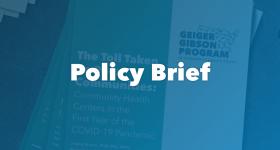The Affordable Care Act (ACA), which marks its tenth anniversary this year, has facilitated the rapid growth of community health centers, allowing them to reach millions of new patients nationwide.


The Geiger Gibson/RCHN Community Health Foundation Research Collaborative has produced studies and analyses across a broad range of issues:

The Affordable Care Act (ACA), which marks its tenth anniversary this year, has facilitated the rapid growth of community health centers, allowing them to reach millions of new patients nationwide.

Community Health Centers Prepare for Funding Uncertainty.
A new analysis underscores the serious consequences for patients, communities and health centers if the Community Health Center Fund (CHCF) is not extended.

60. Community Health Centers Continue Steady Growth, But Challenges Loom.
A new analysis examines the continued growth of America’s community health centers.

A new analysis estimates the impact of Medicaid work requirements in Arizona, Indiana, Ohio, Michigan, Arkansas, Kentucky and New Hampshire on beneficiaries who get care at community health centers.

What Could New Hampshire’s Medicaid Work Experiment Mean for Community Health Centers?
A new analysis of New Hampshire’s Medicaid work demonstration estimates that 2,500-3,779 community health center patients are at risk of losing coverage as a result of work and reporting requirements.

Community Health Center Financing: The Role of Medicaid and Section 330 Grant Funding Explained.
Since their 1965 beginning as a small War on Poverty experiment, community health centers have matured into a principal part of the health system for thousands of medically underserved urban and rural communities that experience elevated poverty and health risks.

58. Examining the Cost Effectiveness of Teaching Health Centers.
A new analysis estimates that the Teaching Health Center Graduate Medical Education (THCGME) program could yield up to $1.8 billion in public program savings over the course of five years, from 2019 to 2023.

A new analysis of Medicaid Delivery System Reform and Incentive Payment (DSRIP) demonstrations concludes that a strong working partnership between Medicaid and community health centers will prove central to successful reform.

The Trump Administration’s newly announced initiative to end the AIDS epidemic in the U.S. by 2030 will require significant expansion of health care and supportive services, including outreach to at-risk populations and communities, services aimed at preventing new infections, and ongoing care and treatment for people living with an HIV diagnosis.

55. How Could the Public Charge Proposed Rule Affect Community Health Centers?
A new report by the Geiger Gibson/RCHN Community Health Foundation Research Collaborative finds that hundreds of thousands of patients could lose access to comprehensive primary and preventive care at community health centers if a proposed rule by the U.S. Department of Homeland Security is adopted.
